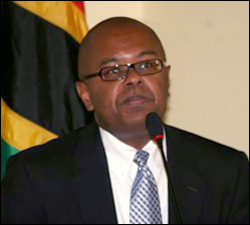
Dr. James Fletcher – OECS
Charlestown, Nevis
October 25, 2010
Strengthening collaboration on key issues which confront member states of the Organisation of Eastern Caribbean States (OECS), will be top on the agenda of the Organisation’s Social and Sustainable Development Unit in the coming year.
The announcement came from Director of the Social and Sustainable Development Unit of the OECS Dr. James Fletcher, when he made remarks at the recently concluded 14th meeting of the Organisation’s Environment Policy Committee in Nevis.
“This will be pursued along three main programme thematic areas ““ climate change, sustainnable development and oceans governance,” he said.
Dr. Fletcher noted that the Unit was in advanced stages of discussion with the United States Agency for International Development (USAID) and the Caribbean Development Bank, on a comprehensive regional programme for climate change adaptation and mitigation.
However, he urged for greater international support for the region for climate change mitigation and adaptive activities.
“We are the victims of climate change and we are paying a high price for the actions of the wealthier, developed world.
“It is only fair, therefore, that we make strong representation to the development partner community to help us mitigate the many, wide ranging impacts of climate change and with the support of our member states, we will be doing just that,” he said.
According to Dr. Fletcher, the climate change programme would be far reaching and would address issues related to capacity building, policy development and infrastructure improvement.
Notwithstanding, the OECS Social and Sustainable Development Director explained that the region was among the most fossil dependent in the world and increases in the price of oil had dramatic impacts on the Gross Domestic Product of member states.
It was for that reason he added that the Unit had been working closely with member states for the establishment of several mechanisms designed increase their resilience to oil price shocks.
Among the mechanisms was the establishment of a regional regulator for the energy sector which would help to put in place the stable regulatory environment which was a prerequisite for the attraction of investments in the sector.
Dr. Fletcher added that they had also been working closely with partners such as GTZ, the Caribbean Development Bank and the United Nations IDO to look at issues related to energy efficiency and the maximisation of investments in renewable sources of energy.
He said they were optimistic that ongoing discussions would soon bear fruit and therefore the energy programme would focus on energy regulation, efficiency and policy coordination.
The third component of the Unit’s work programme would revolve around ocean governance and according to Dr. Fletcher will speak to issues of Maritime Boundaries Delimitation (MBD) and marine resources management.
“We have received significant support from the University of Dalhousie and the Commonwealth secretariat to address MDB capacity building and we are pleased that the Government of Finland has recently signalled a strong interest to work with us in that area,” he said.
That programme, he noted, would require close inter-agency collaboration, particularly among Fisheries, External Affairs and Trade and Environment Departments.